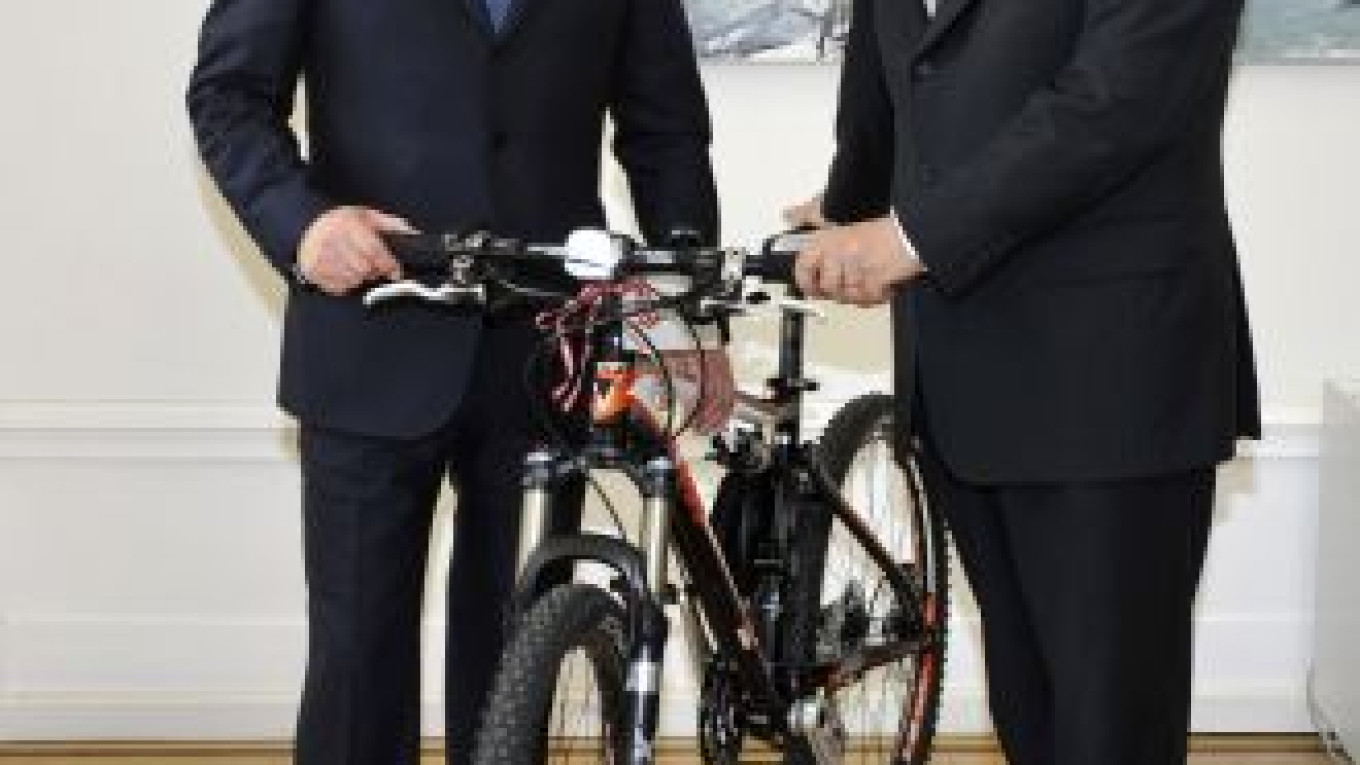Austria agreed to join the South Stream project on Saturday, a key step toward beginning construction on a pipeline that aims to increase the flow of Russian gas to Europe.
Prime Minister Vladimir Putin, who presided over the deal, said supplies of Russian gas to Austria would increase by 2 billion cubic meters a year after South Stream's launch, according to a transcript on the government web site.
The deal, signed by Energy Minister Sergei Shmatko and Austrian Economy Minister Reinhold Mitterlehner, grants permission for South Stream to cross Austrian territory.
Austria, which gets 60 percent of its gas from Russia, became the seventh country to sign on to the 900-kilometer South Stream pipeline, following Croatia, Bulgaria, Serbia, Hungary, Greece and Slovenia.
Putin took the opportunity to mock preparations being made for the rival Nabucco project, a 7.9 billion euro ($10.6 billion) pipeline that aims to supply Caspian gas to Europe. But Nabucco, spearheaded by Germany's RWE, Hungary's MOL, Romania's Transgaz, Bulgaria's Bulgargaz and Turkey's Botas, has struggled to get off the ground as it has so far failed to book enough gas to fill its pipes.
"Before constructing something, one should sign supply contracts. Construction of the pipeline without contracts is dangerous and makes no sense. Name me just one contract for Nabucco," Putin said.
Austrian Chancellor Werner Faymann said he did not see a conflict between Nabucco and South Stream and that Austria, which also supports Nabucco, was interested in different ways of diversifying its gas supplies.
"And we don't know yet, if there will be gas supplies via Nabucco," he told the news conference.
Austrian energy company OMV, already participating in Nabucco, will also join the South Stream project, having reached a deal with Gazprom on Saturday to build Austria's section of the pipeline.
South Stream's south arm will terminate at an OMV hub, which all serves as a finishing point for Nabucco.
"[South Stream's] precise route will be determined and the costs of the project evaluated," OMV said in a statement. "The final investment decision is set to be taken within 18 months."
Gazprom chief executive Alexei Miller, who signed the deal with OMV, talked up the 8.6 billion euro project, which is bankrolled largely by Gazprom, calling it "economically effective," RIA-Novosti reported.
"After the implementation of the project is finished, Southern and Central Europe will be safe from transit crises and cold winters forever," Miller said.
Gazprom plans to complete talks with the French power group EDF on joining the South Stream pipeline over the next 1 1/2 to 2 months, Miller said.
EDF agreed to take a stake in the South Stream in December, and Gazprom deputy CEO Alexander Medvedev told Bloomberg last month that his company could reduce its stake below 50 percent to allow EDF to participate. Currently, Italy's Eni is an equal partner with Gazprom in the project.
Putin said Russia was ready to start construction of the South Stream projects as quickly as it began working on Nord Stream, another pipeline aimed at reducing transit risks to Russian gas.
Construction began on Nord Stream, which will run under the Baltic Sea from Vyborg, Russia, to Greifswald, Germany, earlier this month.
"We intend to implement the project anyway. We started construction on the Nord Stream in the Baltic Sea, and we are ready to start work in the Black Sea quickly as well," Putin said at a joint news conference with Austrian Chancellor Werner Faymann.
Putin emphasized that, while he was not opposed to Nabucco, Russia-backed pipelines would be sufficient for fulfilling Europe's gas needs.
"We can satisfy the growing demand of the Russian economy and the growing demand of … almost all our clients in Europe for 100 years ahead. And the issue is not whether Russia can provide it or not. It's the issue of diversification of supply routes to consumers in Europe. The South Stream contributes to solving this issue," he said.
Last week, the Nabucco consortium announced a 3.5 billion euro tender for supplying pipes and necessary equipment to construct the pipeline in an attempt to sooth concerns about the start of the project.
A Message from The Moscow Times:
Dear readers,
We are facing unprecedented challenges. Russia's Prosecutor General's Office has designated The Moscow Times as an "undesirable" organization, criminalizing our work and putting our staff at risk of prosecution. This follows our earlier unjust labeling as a "foreign agent."
These actions are direct attempts to silence independent journalism in Russia. The authorities claim our work "discredits the decisions of the Russian leadership." We see things differently: we strive to provide accurate, unbiased reporting on Russia.
We, the journalists of The Moscow Times, refuse to be silenced. But to continue our work, we need your help.
Your support, no matter how small, makes a world of difference. If you can, please support us monthly starting from just $2. It's quick to set up, and every contribution makes a significant impact.
By supporting The Moscow Times, you're defending open, independent journalism in the face of repression. Thank you for standing with us.
Remind me later.


